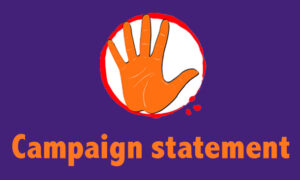Honor killings in Iran during the COVID-19 pandemic and the Response of Women’s Rights Activists
by: Rezvan Moghaddam
An honor killing, is the murder of a member of a family, (mostly a women) due to the perpetrators’ belief that the victim has brought so-called disgrace upon the family. Typical reasons include divorcing or separating from their spouse, refusing to enter an arranged, child marriage or forced marriage, being in a relationship or having associations with social groups outside the family that is strongly disapproved by one’s family, having premarital or extramarital sex, becoming the victim of rape or sexual assault, dressing in clothing, and engaging in non- heterosexual relations. Nowadays, with the development of social networks and cyberspace activities, an internet chat or sending a text message, publish photos in cyberspace may be considered disrespectful by the men of the family, husband, father or brother.
Honor killings are often the result of utterly misogynistic views of women and the inferiority of women in society.in addition, LGBT persons often reveal exposure to physical and sexual violence, the threat of execution and honor killing. Men can also be the victims of honor killings by members of the family of a woman with whom they are perceived to have an extramarital affair relationship.
According to the U.N. High Commissioner for Human Rights, “In the name of preserving family ‘honor,’ women and girls are shot, stoned, burned, buried alive, strangled, smothered and knifed to death with horrifying regularity.[1].”
Just as the Pandemic COVID- 19 increased and deepened economic and social pressures along with increasing social isolation and mobility restrictions, so did gender-based violence[2]. At this time, the lack of access to social support services for traumatized women has caused women to be in a closed and unsuitable environment with their abusers for a long time during the quarantine period, and to be controlled more by the men of the family.
There is no doubt the COVID-19 pandemic has exacerbated all forms of gender-based violence throughout the world a growing reality the UN has referred to as a “shadow pandemic. “Each day brings horrific new headlines in media and social networks which, stating that, a woman or girl has been killed by a male relative for allegedly bringing dishonor upon her family. According to a study by the Social Emergency Center in Iran, the number of reports received by the center of domestic violence during the pandemic has increased significantly.
Honor killings can happen because of being on virtual social networks, even a simple chat on Telegram, WhatsApp or posting a picture in face book. The man who killed his wife for being a member of the Telegram group. He stated this during the interrogation: “My wife had just joined a telegram group and I did not want her to do that. On the day of the accident, I saw that she was chatting with her phone. We argued about this. “The fight escalated and we got into a fight and I attacked her with a knife.”
Among these murders in 2020; three murders attracted more media attention than the others. The murder of 14-year-old Romina Ashrafi by her father with a sickle, which was sparked a wave of outrage and concern among civil society activists and even ordinary people. Fatemeh Barhi, 19, was killed by her husband in Abadan, a city in southern Iran, and Reyhaneh Ameri, 22, was killed by her father with an ax. Reyhaneh’s guilt was that she chose a modeling job for herself and her father did not consider this job suitable for family matters.
Romina was in love, Fatemeh did not want to be her cousin’s wife and wanted a divorce, and Reyhaneh had chosen modeling as her job. These are examples of women who were killed because they did not want to obey the men of the family.
Following such a wave of naked violence against women, a campaign to stop honor killings was launched, and women’s rights activists with in Iran and abroad joined it to take steps to address this social problem by trying to create a culture and change discriminatory laws. At the same time, another group of overseas civil society activists launched a campaign so called men against honor killings.
The Campaign to “Stop Honor Killings” in Iran is an independent body and its activities are initially centered on two issues: the change in the law and culture-building
Honor killings are deeply rooted in ancient patriarchal and fundamentalist traditions. In traditionally male-dominated societies Women are considered the property of the males and women are expected to obey the men of the family like their father, husband and brothers. However, honor killings have no borders and occur in all cities and provinces of Iran. Today, honor killings in Iran has become a serious crisis.
In my research documenting 1,220 honor killings from 2000 to 2020, shows that 30% of honor killings took place in Tehran province and Markazi province, and contrary to popular belief, these honor killings are not limited to remote villages and small towns.
In this study, out of 1220 murders, 191 honor killings that occurred in 2020 have been documented. Another result of this research documenting honor killings in Iran 33 honor killings were committed between May and June 2021. Of course, these statistics do not include all cases of honor killings. Due to the lack of access to the information related to the honor killings and many honor killings do not reach the media. Also some honor killings are recorded as suicides.
While studying honor killings, in some cases, victims of honor killings are first perpetrated by a man or with the cooperation of family men, including brothers, uncles, and cousins, in ways such as forcing the victim to eat poison, suffocate and then hang, electrocute, or He was killed by fire and pretended to have committed suicide.
The most important reasons in the murder of women by male family members are tribal and ethnic prejudices as well as the society at large which considers women unequal to men. In addition, biased concepts embedded in books and literature and encouraged by the social media and also laws which encourage violence against women and the culture of women inferiority as well as lack of support system all play a role in establishing a culture which sees women as men’s and family’s honor and thus males responsible to safe guard such concepts. Such embedded culture creates violent men who ultimately become murderers.
Part of “masculinity” is related to the social status of men. If this “masculinity” is somehow threatened or diminished, the man may try to regain it. So in order to prove his “zeal and manliness” in this case, it will not be satisfactory enough for the killer to simply kill. He has to record it and then show it to his peers or walk around the city with a bloody knife and says I killed her! Says I washed this stigma! The killer is sure that he will not be punished or that his punishment will be very light, up to 3 years in prison.
Judicial systems in Iran legitimize by pardoning offenders or handing out light sentences, there are articles in the civil and criminal laws of the Islamic Republic of Iran that are contrary to the Universal Declaration of Human Rights, such as Articles 630, 301, 302 and 303 of the Islamic Penal Code. According to the laws of Sharia, and the Islamic Penal Code, The murder of a child is not retribution, but retribution becomes atonement and ta’zir.
The sentences were handed down by the court to punish the killers of three murders that I mentioned,Fatemeh Brihi’s husband was released from prison after a few months with the consent of Fatemeh’s father. Romina’s father was sentenced to nine years in prison and may be released after serving half of his sentence. Reyhaneh’s father has not yet been sentenced..
Women and children along with other marginalized groups of gender, sex, religious and ethnic minorities are not protected by law. Sharia laws, in particular articles of the Islamic Penal Code, together with the discriminatory viewpoints of the legislators and the judiciary system, allow men to kill women and young girls in their kinship with impunity or with the least punishment.
We believe that the laws must protect the society’s interest and the people, regardless of gender, religious beliefs, ethnicity and race. Ancient tribal beliefs and practices must be replaced, and equality for all should be at the center of the legislation. Progressive laws are essential if society is to move forward.
. Our Campaign demands an end to killing women in order to preserve the man’s “honor”. Changing culture through an overhaul of the curriculum for public education, teaching the concept of equal rights for all, and providing practical instructions at all levels are crucial components of the desired transformation. Removing discriminatory laws from the legislations and replacing them with the international standards of equality, human rights and fundamental freedoms are also other necessary steps to be taken.
We in Stop honor killings campaign demanding that The Islamic Republic of Iran should repeal all laws that support honor killings, and the international community act more forcefully to stop honor killings.
Rezvan Moghaddam
[1] https://projects.iq.harvard.edu/violenceagainstwomen/publications/honor-killings-can-murders-women-a
[2] Vora M Malathesh BC Das S Chatterjee SS COVID-19 and domestic violence against women. Asian J Psychiatr. 2020; 53102227


















It is so important to publish these artickes and let the world know what is going on in some societies. You are so brave. I admire you!!!
Dear Petra,
Thank you for your comment and interest in the campaign stop honor killings.he This is the tip of the iceberg.
Dear Petra,
I Hope i could be a voice for the women who do not have any voice and they under torture by men family
Best regards